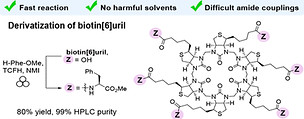Research interests
Supramolecular Chemistry research group, lead by Riina Aav, is focusing on intermolecular interactions in order to understand complex systems of molecules and find greener approaches in chemistry. We are developing sustainable synthetic methods and designing new chiral supramolecular receptors for sensing chirality and chiral separation. We are also looking for methods to recycle and valorize waste in order to decrease pollution.
Synthesis and Self-assembly of chiral hemicucurbiturils



Supramolecular receptors for sensing and separation



Mechanochemical synthesis


_edited.jpg)


Mechanochemical Organic Synthesis. Mechanochemistry is an age-old technique that has received renewed interest in recent years due to its ability to carry out organic reactions with minimal or no solvent use, by milling and grinding solid reactants together. This reduced reliance on solvents decreases environmental impact, enhances safety, and improves cost-effectiveness, making it highly attractive for industrial applications. In addition to the benefits associated with green chemistry, mechanochemistry also significantly increases the reaction rates and reactivity of solids, including metals, helping to resolve long-standing challenges in organic synthesis. Our laboratory is dedicated to advancing organic synthesis through the incorporation of mechanochemical methods. This includes enhancing the synthesis and post-synthetic modifications of supramolecular receptor molecules and active pharmaceutical ingredients. We are also developing new mechanochemical synthetic methodologies that improve the performance of organic reactions by eliminating the use of solvents. Furthermore, we aim to facilitate the integration of mechanochemical processing into industrial manufacturing to enhance the circularity of scarce resources and materials. Our additional expertise includes assessing green chemistry metrics and the safety and impurity profiles of mechanochemical processes.
Starting and ongoing projects:
1. HORIZON-HLTH-2021-IND-07, 101057286 IMPACTIVE "Innovative Mechanochemical Processes to synthesize green ACTIVE pharmaceutical ingredients." (2022 - 2026)
2. COST CA22131 - Supramolecular Luminescent Chemosensors for Environmental Security (LUCES) (2023-2027)
3. ÕUF17 The separation, processing, and recycling of rare earth metals (2023–2029)
4. Estonian Research council, PRG2169, "Self-assembled Chiral Hemicucurbiturils as a Versatile Platform for Supramolecular Sensing and Separation of Chiral Compounds (2024−2028)
5. TK228 Centre of Excellence in Circular Economy for Strategic Mineral and Carbon Resources (2024–2030)




Current and previous funding:





